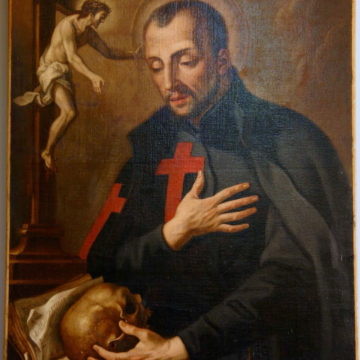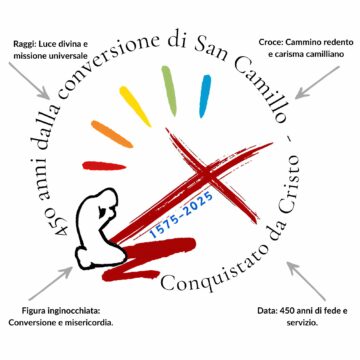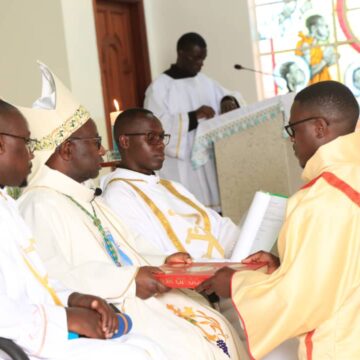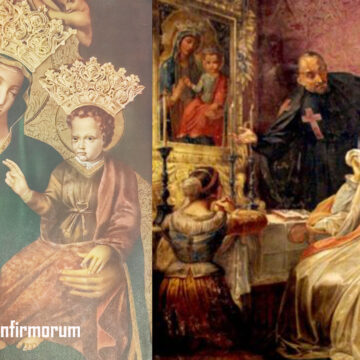The nutshell of today’s readings is that we are invited either to become the beloved of the Lord or to participate in the feast of the Lord with others as His beloved. For this, we have to ask the incorruptible Wisdom to help us to know the time of these festivities (cf. Wisdom 6:12-16), to help us not to lose hope and faith in the Lord’s promise of including us who are ready to participate in the banquet (cf. Thessalonians 4:13-18) and to be very much alert, watchful and aligned for these festivities as the 5 bridesmaids (cf. Matthew 25:1-13).
Context of the Parable in St. Matthew 25:1-13
Jesus used the marriage custom familiar with his contemporaries. This marriage custom had the following procedure:
- The wedding festivities began at the bride’s house. Late in the evening, the groom would arrive to escort the bride to his father’s
- Last minute bargaining between the groom and his father-in-law over the dowry or bride-price was
- Such bargaining symbolized the esteemed value of the bride, but many times delayed the wedding.
- When both parties agreed upon the dowry, the groom would lead the wedding party back to his father’s house for the ceremony and
- By now, town criers proclaim the arrival of the groom. Such proclamations alerted those who did not stay at the bride’s house or who waited for the ceremony to
- Since this was an all-night celebration, napping between events in the wedding was reasonable.
- The waiting girls in the parable were most likely cousins or sisters of the
- As the welcoming party for the groom’s family, they would alert others about the groom’s impending
- Their lamps were fueled by oil. Since the lamps were small, they needed constant maintenance with additional oil and adjustment of the
- The lamps could be set low for rest time and readjusted for greater light when
The Parable in the light of St. Matthew
In Matthew, Jesus connected the image of the wedding feast to God’s Kingdom. When Jesus told this festive story specifically for his followers, the principles in the wedding took on symbolic weight.
- The groom was the Christ. The town crier was the evangelist who proclaimed the coming King in the marketplace. The night represented the dark times of persecution prophesied before the final
- All the signs pointed toward the lived experience of Matthew’s audience: a Jewish- Christian community awaiting Jesus’
- The two most interesting symbols were the ten girls with their lamps. The waiting girls were Christians longing for the Christ, the
- The lamps represented the disciple’s example which gave light to the world. In this context, the time of slumber became the delay of the Lord’s
- The extra oil became the faith which fueled the follower’s example during the
- Lazy Christians were those foolish girls who did not renew their faith and allowed their example to They depended on others for motivation but their dependence would fail them, as would their faith and example fail.
- They would stand outside calling upon a Lord who did not know them, because they did not get to know the
In this context, Matthew insisted upon an alert spirit. Preparation meant more than declaring one’s self a follower. It meant a constant and growing relationship with Christ through prayer and example. In Matthew, preparation meant action.
Application of the Parable
The parable of the 10 virgins speaks about our alertness, our preparedness and our alignment for the feast of the Lord. Alertness helps us to be sufficiently prepared and aligned to meet the Lord. It is a very good experience to meet our Lord prepared and ready when He comes. But it is the saddest experience to miss Him because of our insufficiency, unpreparedness and no alignment.
The parable reveals two happiest parts and one saddest part of our life:
- The first happiest part of our life is we are the privileged partners of Christ: Jesus our Bridegroom accepts each of us to be His bride and He bargains with everyone including our family people, our friends, and our close relatives to get us at any cost through bride-price because we are very much valued in His sight. Once He wins in this bargaining and agrees upon with a certain price, He takes us to our Father’s house, that is, to His Church, for the
- The second happiest part of our life is we are the ambassadors for Christ: Jesus accepts all of us to be ambassadors to spread His joy with His bride, to be His 5 sensible bridesmaids. We are these ambassadors who are aligned and prepared with the oil of gladness to infuse in the lives of others the joy of Jesus. Our religious vows alone are not enough to live our consecrated life but we should be aligned to become ambassadors to spread the joyful moments of our companions of travel because our commitment to Jesus is the festivity for which everyone is If we are not joyful ambassadors, there is no value for our vows.
- The saddest part of our life is we fail to be ambassadors for Christ as we unfortunately resemble the 5 foolish virgins in our insufficiency to meet the Lord. Why? It is because we are foolish even though we are trained in the school of the Lord; we wait for the Lord without joy because waiting seems to be something heavy; we are tired of many activities and so we fall asleep as workaholics; we get wakened at certain time by our conscience to trim our lamps with the hope of finding some joy but our oil of gladness has already gone out; we ask others to help us with some joy which will not be given; so we go out to buy some joy from outside, while the Lord comes and shuts the door and we miss Him. What a terrible end!
Reflective Action for Life
- First of all, let the parable discomfort us because we have forgotten to be the beloved bride of the Lord, to be the ambassadors for Him to spread the joy of the Lord with many chosen companions of travel, and to have chosen many foolish activities which don’t align us according to our vocation to be the partners and
- Secondly, let the preparation be a challenging choice, which calls us to a state of constant alertness and of perpetual openness to God’s dramatic future in
- Thirdly, let the preparation be meant for everyone: it is not for some who are at the verge of Everyone is called to live with a keen awareness of Jesus’ return, an alertness tempered by preparation for Jesus Himself.
- Fourthly, let the words of Jesus from inside the room “I don’t know you” not be repeated in our history, instead let us hear the invitation of Jesus “Come and dine with me because you are sufficiently alert, aligned and prepared to meet ”
- Fifthly, let us reflect on our current personal struggles wherein we miss Jesus. Let us take one of those struggles and reflect how Jesus gets involved in the struggle, and where he is leading
Concluding points
- So, it is all about priorities. It is about who we are and who Jesus truly is in our
- It is about how we invest our vocation God has given us. It is about how our lives are fundamentally aligned towards Jesus’ plan of
- It is better to get aligned with God’s direction in the wheel of our life so that we can reach our destiny safely with proper discernment of spending our waiting time with the oil of
- It is better to wait for the party to start even though Jesus hasn’t arrived yet. We have no choice but to wait for













Camillians on Facebook
Camillians on Twitter
Camillians on Instagram